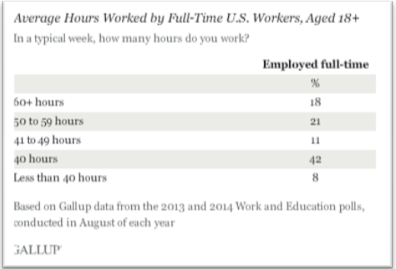Much to the detriment of our health and well-being, many societies celebrate obsessive work habits. Being a “workaholic” has become a badge of honor, one that unfortunately describes too many of today’s working people.
In 2014, Gallup reported that the average hours worked by full-time U.S. Workers was 47 hours, and 21% of respondents worked 50-59 hours, and 18% worked 60+ hours.
Since that survey was conducted, 25% of survey respondents reported working 45 – 59 hours/week, and 17% reported 60+. These figures show that half of people work over 40 hours a week.
But the number of hours worked is not necessarily an indicator of a workaholic. The term is used to refer to a negative behavioral pattern characterized by excessive time working, an inner compulsion to work hard, and a neglect of family and other social relations.
Workaholics often strain their personal relationships. If you’re married to your work, how much attention can you give your partner? Instead of quality time with family and friends, workaholics constantly obsess about business, emails, phone calls and reports carried home. They end up not getting enough caring support, recreation, exercise, good meals, and sleep.
Research shows how damaging overworking and obsessing about work is to health. Why, then, do we do it? Is there another way to get the work done, get ahead, and avoid the health risks of heart attacks, anxiety, burnout, weight gain, and cigarette and alcohol consumption?
I’m curious: how many hours a week are you working? In my work as a coach, my clients tell me they often answer emails after hours and have been known to work during vacations. And they catch themselves thinking over work problems at home.
What about you? As always, I’d love to hear from you. I can be reached here or on LinkedIn.

Did You Enjoy This Article?
Join thousands of other smart business owners like yourself & get our Proffittable Times newsletter.
It's filled with actionable content you can apply immediately.
Sign up now to get started!
– Coach Nancy











